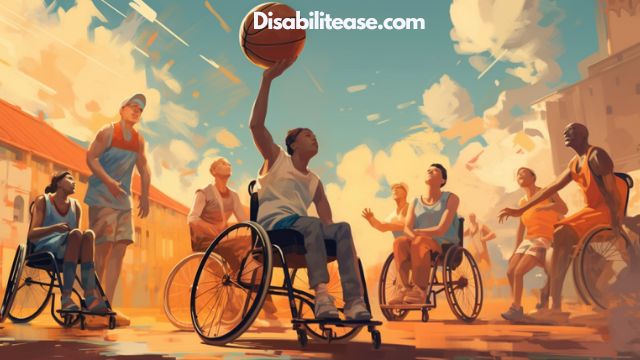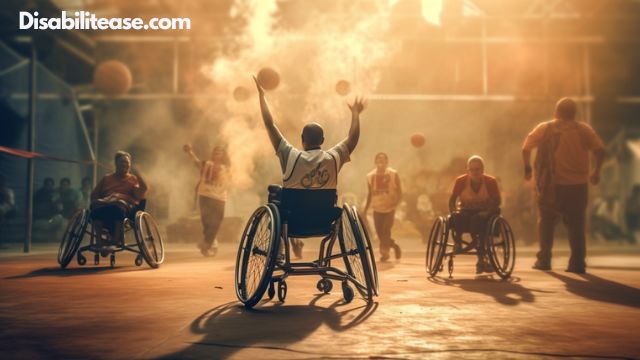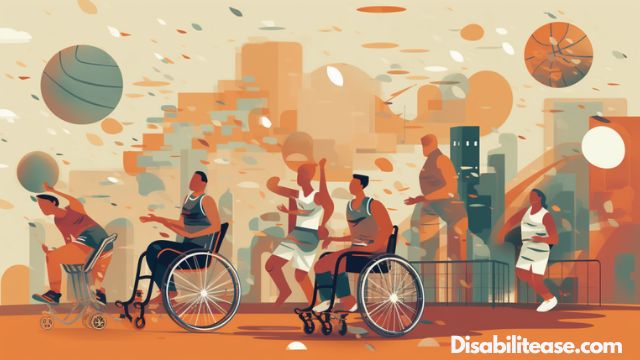Participating in team sports can be incredibly rewarding for disabled and elderly individuals. Not only does it provide physical and emotional benefits, but it also gives them a chance to socialize and connect with others.

Taking part in team sports allows them to stay active, challenge themselves, and cultivate a sense of belonging. You don’t have to let disability or age hold you back from enjoying the many advantages that come with being part of a team!
With some adaptations and adjustments, everyone can join in the fun. Read on to learn more about how disabled and elderly individuals can participate in team sports.
Table of Contents
Benefits of Team Sports for Disabled and Elderly Individuals
Being part of a team can be incredibly rewarding for disabled and elderly individuals, providing them with the chance to connect with others and stay physically active. Team sports provide an invaluable opportunity to be included in a safe, supportive environment where everyone is accepted and encouraged to do their best.
Inclusive coaching ensures that people of all abilities are welcomed and accommodated on the team. Adapted equipment may also be used when necessary, making it easier for many disabled or elderly players to participate in physical activities.
Team sports can help build confidence by teaching valuable skills such as communication, problem-solving, teamwork, leadership, and respect for oneself and others. Participating in team sports also offers a great way for disabled or elderly individuals to socialize with peers while having fun at the same time. It provides an outlet to express themselves without judgement from society or limitations they may experience in daily life.
For some disabled or elderly individuals who have difficulty leaving home due to mobility issues, virtual team sports can be a great option as well. This type of sport allows players from all over the world to come together online and compete against each other in real-time games. Not only does this provide an excellent way to stay connected with friends but it also gives these individuals the chance to explore new friendships while competing in exciting activities from home!
Adapting Team Sports for Disabled and Elderly Individuals

You can still join in the fun, even with limitations. Adapting team sports for disabled and elderly individuals is an important way to ensure everyone can participate.
There are several ways organizations, coaches, and teammates can work together to make sure that all needs are met.
Organizations should focus on accessibility needs and create a safe environment for everyone involved in the sport. This may include making physical accommodations such as widening doorways or installing ramps or adapting equipment like providing wheelchairs or bikes with seatbelts so those who need them can properly participate in the game.
Coaches should be aware of any special instructions needed for disabled or elderly players so they know how best to help them during practice and games.
Teammates have an important role too when it comes to adapting team sports for disabled or elderly individuals. It is essential that everyone shows respect for their teammates’ individual abilities and physical limitations while also encouraging one another to do their best throughout the season.
Teammates should always be mindful of how they communicate with each other when working on drills, playing games, and celebrating successes together on the field.
By coming together with an open mind and a shared commitment to inclusion, organizations, coaches, teammates—and especially disabled and elderly players—can create a successful experience that will benefit everyone involved!
Strategies for Inclusion in Team Sports

Including everyone in team sports, regardless of age or ability, is key to creating a unified and supportive environment. Coaches, players, and other members of the team can make sure that disabled and elderly individuals are included by implementing certain strategies.
For instance, coaches can be open to making equipment modifications when necessary and taking extra time to teach skills in an inclusive manner. Players can work together to ensure that disabled or elderly individuals are included without feeling left out or singled out for their abilities.
Coaching strategies also play a role in inclusion. Coaches should focus on teaching individual skills rather than focusing solely on the outcome of the game. They should provide instruction in ways that meet the needs of every player, not just those who may have more experience with sports. Additionally, they should strive to create an atmosphere where everyone feels comfortable participating and contributing their own abilities.
Equipment modifications can help level the playing field for disabled or elderly individuals as well. If needed, certain pieces of equipment such as wheelchairs or special grips can be used so that all players have access to the same tools for success during games and practices alike. This will allow these individuals to participate at their optimal level while still enjoying the sport they love alongside their teammates.
Conclusion
You can reap the same rewards from team sports regardless of age or ability. It just takes a little bit of creativity and willingness to adapt.
When everyone on the team is open to finding ways for everyone to participate, amazing things can happen. Not only do you get to enjoy all the benefits of playing a sport together, but you also foster an environment of inclusion and understanding.
So don’t let disability or age stop you from joining in on the fun – get out there and start playing!

Hi, my name is Eddie, I am a professional trainer specializing in the elderly population and I’m also a website designer. I love training in the gym, going to the beach, traveling, and having good food.
I combined my love for sport and website designing to make “DisabilitEase” whose purpose is to help elderly and disabled people live a more full and active life, have more fun, and enjoy their unique journey despite any disability.



